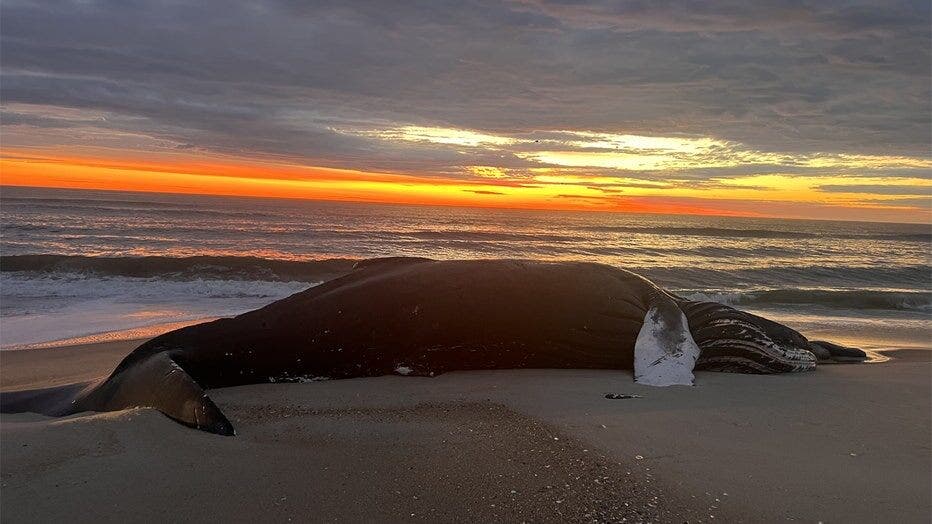US government agency says 'no link' between dead whales and wind farm development
Dead whale found on beach at Assateague Island
Hugh Hawthorne, the superintendent of Assateague Island National Seashore, discusses the dead whale that washed ashore on the beach Monday. Hawthorne said he can't pinpoint why this whale died, but the National Oceanic and Atmospheric Administration is investigating the matter.
An independent government agency focused on the protection and conservation of marine mammals said this week there is no evidence linking the recent string of dead whales washing ashore to wind farm development.
This winter, 16 whales have washed up dead along the Atlantic coast in places like Assateague Island in Maryland, Virginia Beach, Virginia, and Long Island, New York.

Dead whale was discovered on the beach at Assateague Island National Seashore on Monday, January 17 (National Park Service)
The standings are part of what the National Marine Fisheries Service, or NMFS, call the Humpback Whale Unusual Mortality Event, which started in 2016.
The Marine Mammal Commission said in a statement posted to its website on Tuesday that 40% of the whales were examined at necropsy and showed evidence that a ship struck them, or they got entangled in fishing gear.
The commission also said these strandings are nothing new, and they are not isolated to the Atlantic coast.
According to the commissioner, at least 10 humpback whales have stranded each year during the UME, though in 2017 the highest number of 34 were recorded stranded.
What scientists have found is the number of humpback whales in the Gulf of Maine is increasing, and the younger whales are moving to the Atlantic coast, where they are vulnerable to being struck by ships.
Many people, though, say wind farm development is the cause of the whale strandings.
READ MORE: Dead whale found on beach at Assateague Island National Seashore
Wind farm development and research is taking place up and down the Atlantic coast, in places like Block Island, Rhode Island; Montauk, New York; off the coast of Ocean City, Maryland, and nearly 20 miles offshore Virginia Beach, Virginia.
Agencies like the National Oceanic and Atmospheric Administration, or NOAA, and U.S. Bureau of Ocean Energy Management, or BOEM, say there is no link between wind farms and the whale strandings.
Now add a third, but independent, agency.
"Despite several reports in the media, there is no evidence to link these strandings to offshore wind energy development," the Marine Mammal Commission said.
The commission also addressed the stranding of a North Atlantic right whale in Virginia Beach on Feb. 12.
According to the commission, the 20-year-old, 43-foot male whale was subject of a necropsy conducted by the Virginia Aquarium Stranding Response Program, University of North Carolina Wilmington, and City of Virginia Beach’s Beach Operation Division.
What scientists discovered was the whale suffered a catastrophic blunt force traumatic injury, impacting the vertebral column.
Independent Women's Forum Senior Fellow and District of Conservation Podcast Host Gabriella Hoffman is not buying the dismissal of wind farms when it comes to the whale strandings.
"The Biden administration is sowing distrust with the American public by instantly dismissing concerns that offshore wind development could be behind the whale deaths," Hoffman told Fox News Digital. "Calling it misinformation or downplaying the concern is why people don’t trust them on the conservation front. Even NOAA fisheries spox Ben Laws told the Chesapeake Bay Magazine that offshore wind could constitute Level A and Level B harassment."
Hoffman also said NOAA conceded that increased traffic from vessels because of wind farm construction could lead to more clashes between whales and boats.
RELATED: Rare Atlantic Sturgeon washes up on Assateague Island
"The dismissiveness coming from the top brass at NOAA Fisheries, BOEM, and the now Marine Mammal Commission leads many, myself included, to believe they don't have the whale's interests in mind," Hoffman said. "A simple investigation by neutral parties is needed. And should it reveal offshore wind is contributing to their demise., the White House should reconsider their goal of achieving 30 gigawatts of offshore wind by 2030."

